Australians paying high price for lack of competition
The increasing dominance of just a handful of big companies across a broad swath of industries has coincided with increasing rates of corporate misbehaviour, less innovation, and higher prices.

The increasing dominance of a handful of big companies across a broad swath of industries has coincided with increasing rates of corporate misbehaviour, less innovation and higher prices for Australians.
Days after Jim Chalmers announced a special Treasury taskforce to look into how to lift the flagging competitiveness of corporate Australia, research by the e61 Institute reveals almost every industry has become more concentrated over the past 15 years.
Research director Dan Andrews said a more than decade-long slide in corporate competitiveness had coincided with the poorest productivity performance in 60 years, and with a marked slowdown in wages growth that had begun to reverse only over the past 18 months.
“High and rising concentration isn’t benign. It can help large incumbents to entrench their positions of dominance and then create entry barriers,” he said.
Independent senator David Pocock on Tuesday accused supermarket giants Woolworths and Coles of “price gouging”, and criticised the government’s recent decision to block Qatar Airways from securing more routes, saying it wasn’t justified and needed to be revisited.
“The parliament needs to step up and give the ACCC more power to ensure there is more competition across airlines, across supermarkets, across a range of industries where Australians are currently getting price gouged because of a lack of competition,” Senator Pocock told the ABC.
Speaking at the National Press Club in Canberra, Assistant Minister for Competition Andrew Leigh did not say whether there was evidence of big firms taking advantage of market positions to charge customers high prices.
Dr Leigh said it was “up to the supermarkets to account for their profits and their approaches”, and he wanted to see more competition in the airline industry.
“Our focus, right across the economy – whether it’s supermarkets, banking, baby food or beer – is to ensure that consumers have more choices and there is more competition,” he said.
Dr Leigh, in a speech outlining the potential for better assessment of policy decisions through the soon-to-be-established Australian Centre for Evaluation, deflected questions about the Qatar decision, saying only that the decision by Transport Minister Catherine King was taken in the “national interest”.
Mr Andrews from the e61 Institute said it was hard to definitively say whether big companies were abusing their position by charging unjustifiably high prices. “It’s plausible, but we don’t have the evidence,” he said.
“It would be good if Coles and Woolworths had more threat of disruption. I’m fine with them having large market shares as long as there is some credible threat of disruption – that’s what matters.
“Concentrated markets per se aren’t a problem as long as there is some threat of entry to make these firms provide higher quality goods at lower prices.”
German discount supermarket giant Kaufland in January 2020 pulled the plug on their planned expansion to Australia after spending a reported $500m, and Mr Andrews said the decision “speaks to me about the barriers to entry” into the local market.
“We’ve always had high concentration, but over the last 15 years this has increased significantly. And it coincides with the productivity slowdown, and the wage growth slowdown,” he said.
Mr Andrews said the evidence showed that highly concentrated markets were more likely to receive ACCC infringement notices – with three times as many contraventions in the airline industry versus the more diverse hospitality sector: “Consumers are also more likely to pay higher prices.”
He backed ACCC chairwoman Gina Cass-Gottlieb’s call to reform merger rules to give the regulator more power to block anti-competitive corporate takeovers.




To join the conversation, please log in. Don't have an account? Register
Join the conversation, you are commenting as Logout